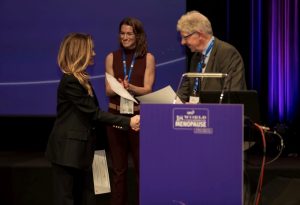At this year’s World Congress on Menopause in Lisbon Stasa Stankovic, a PhD student in the Unit’s Early Life Aetiology and Mechanisms programme, won the Robert Greenblatt Award for the best research in the area of basic science related to women’s health and menopause. Stasa presented her latest research to the congress on the genetics of reproductive ageing and fertility in women as one of six nominees for the award.

The Robert Greenblatt Award is the most important prize for young investigators under 40 in the field of the Menopause, and is awarded every year by the International Menopause Society for the best papers presented at the congress in either basic or clinical menopause-related research.
Stasa Stankovic is a third year PhD student, supervised by Professor John Perry, Professor Ken Ong at the Unit and Professor Eva Hoffmann at the University of Copenhagen. Stasa’s project elucidates the potential of genomics and proteomics techniques in reproductive ageing and fertility, highlighting its impact on UK healthcare. She is specifically focused on understanding the genetic architecture behind menopause and reproductive lifespan, and their link to later-life cardio-metabolic health outcomes in women.
Currently, in clinical practice there isn’t a single test that can predict the menopausal age nor the methodology that can prolong reproductive window and improve fertility. Using cutting-edge genomic technologies in large-scale population studies, such as UK Biobank, Stasa and her colleagues were the first to identify the largest number of genetic markers that determine the age of menopause and demonstrate the ability to through genetic manipulation of discovered gene candidates slow down ageing of ovaries and prolong fertility in mice. This has a potential to pave the way to fertility treatment that could extend the natural reproductive lifespan of women, and to novel markers to improve the prediction of early menopause and natural fertility window, thus helping women make more informed reproductive choices.

 MRC Epidemiology Unit
MRC Epidemiology Unit